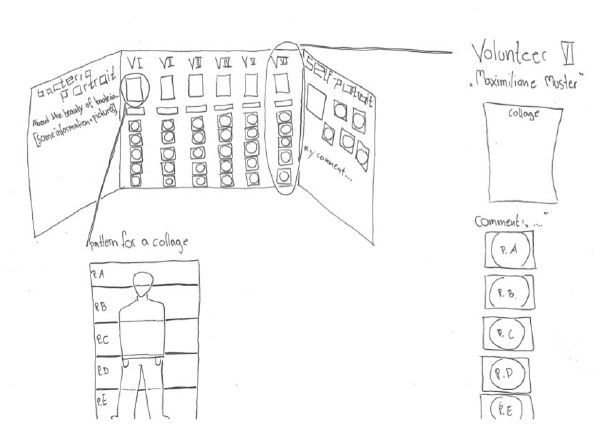(→Medium) |
(→Medium) |
||
| Line 34: | Line 34: | ||
*agar (15g/l) | *agar (15g/l) | ||
*sodium hydroxide to adjust the pH to 7. | *sodium hydroxide to adjust the pH to 7. | ||
The medium is autoclaved for 20 minutes at 121 degrees. | The medium is autoclaved for 20 minutes at 121 degrees. | ||
Revision as of 11:28, 27 November 2021
bacteria portrait
Idea
The idea is to grow bacteria from different parts of the body in separate petri dishes. The cultivated bacteria are to be assembled into a kind of self-portrait.
Futher idea
The next step is to cultivate the body's own bacteria from volunteers. On the one hand, this gives us the opportunity to compare the results. Do our bacteria look similar? How individual are we on our skin? On the other hand, it shows a new side of ourselves. These portraits are meant to show that there is another way to present our self besides photos. But it is important to remember that this idea is a speculation and not a scientific experiment. There is no proof that the bacteria grown are actually endogenous.
Medium
For the cultivation of bacteria you can use the LB - medium.
Ingredient
- Yeast extract (5g/l)
- tryptone (10g/l)
- sodium chloride (0.5-10g/l)
- agar (15g/l)
- sodium hydroxide to adjust the pH to 7.
The medium is autoclaved for 20 minutes at 121 degrees.
Realisation
I used 5 Petri dishes. I transferred bacteria from different parts of the body into each dish with a cotton swab: Petri dish (P.) A - eyes, P. B - oral cavity, P. C - belly button, P.D - vagina, P.E - feet The bacteria have grown for 2 weeks. The temperature was usually 20 degrees.
P. A-E after two weeks
Presentation
There are several ways to present the portrait.
One of them is a photo collage. Combining only the photos of the bacteria or combining the photos of the bacteria with photos from the person.
Another way of presenting is an exhibition. Each person would have their own wall. The photos could be presented individually and in close-up. Both, the direct photos and those under the microscope. Instead of showing the photos, one could also display the petri dishes with the bacteria. With a microscope provided, the visitors could actively participate.
Alternatively, the bacteria could be grown on a larger culture medium for better presentation.















